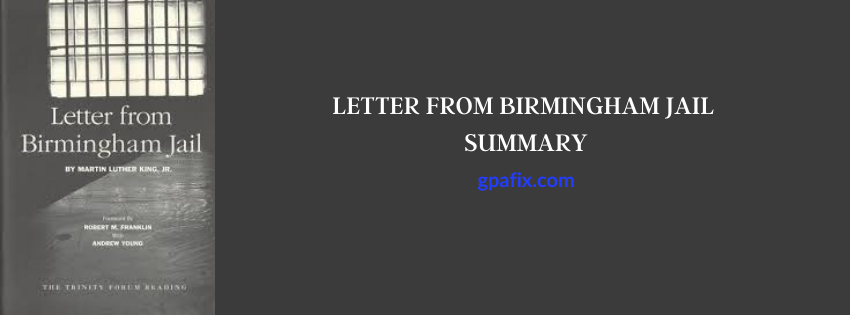Perhaps you are wondering ‘who was the Letter from Birmingham Jail written to’ or maybe you want to write Dr. Martin Luther King Jr. Letter from Birmingham Jail summary and don’t know the way to go about it. Often, students find themselves torn between what to include and what to exclude from a summary. Learn how to write a summary from this blog, Martin Luther King’s “Letter from Birmingham Jail” summary in particular. You may want to reach out to GPAFix experts for a Letter from Birmingham Jail summary in case you find a challenge completing the summary.
This article highlights a Letter from Birmingham Jail summary. Read through towards the end to get an overview of African American struggles with racial injustice, and Martin Luther King Jr. steps in to help. You may request a customized Dr. Martin Luther King Letter from Birmingham jail summary from gpafix.com at any time of the day, whether urgent or not. We are here for you.

A “Letter from Birmingham Jail” Summary
“Letter from Birmingham Jail” was written by Martin Luther King Jr. as a response to criticism that arose from non-violent protests that took place on 16th April 1963 in Birmingham, Alabama. He responds specifically to the eight white clergymen’s open statement in a newspaper that terms the protests as “unwise and untimely.” The local newspaper also condemns “outsiders” for leading the protests, something that makes Martin Luther King Jr. push for dialogue. He believes that the white clergymen are people of “genuine goodwill” who have sincere concerns; he, therefore, wants willingly wants to react to their open letter in “patient and reasonable terms.”
The “Letter from Birmingham Jail” was written by MLK while he was in prison. He had been arrested for participating in the marches and protests in Birmingham. Martin Luther King Birmingham jail letter is not a linear story—it is more of an exploration of the various themes portrayed in the African Americans’ struggle for equality.
The Overview of “Letter from Birmingham Jail” Outline
As earlier mentioned, the Letter from Birmingham Jail does not follow a linear story structure. Note that the letter addresses the African American struggles with civil injustice rather than a story.
Martin Luther King’s Letter from Birmingham Jail summary begins with King addressing the clergymen’s criticisms and concerns about the presence of “outsiders,” referring indirectly to the Southern Christian Leadership Conference.
Why Birmingham
Martin, an “outsider” in Alabama, participates in the protests because he feels compelled to, just like Apostle Paul and early Christians. He clarifies that the Birmingham African American residents are the ones that invited him to support them in fighting the racial injustice witnessed in the city.
Being the Southern Christian Leadership Conference president, an organization with its operations in every Southern American state, the people of Alabama invited King to participate in the non-violent demonstrations. He argues that he is in Alabama because injustice prevails in the area. He cannot ignore other people’s suffering because “injustice anywhere is a threat to justice everywhere”—mark this as one of the quotes from Letter from Birmingham Jail.
Martin Luther King Jr. also goes ahead to refute the clergymen’s statement about “outsiders,” questioning the idea that a citizen of the United States can be considered an outsider within their own country. He says that the oppression being faced by African Americans in Birmingham through the white power structure extends on a national scale. This has left the African American community with no alternative but to take action; protest.
Dr. Martin Luther King Jr. Letter from Birmingham Jail continues to state that Birmingham is one of the most segregated cities in the US, with lynching and police brutality directed towards the African Americans. There is rampant mistreatment in courts and bombing of the Negro homes and churches, pushing for non-violent demonstrations. Negro leaders pushed for an agreement with the city leaders and agreed that if the advocates for African American rights did not march, “humiliating racial signs” would be removed. However, the racism signs were returned, and the Negros had no choice but to protest.
King’s Commitment to Nonviolence
Writing a summary of Letter from Birmingham Jail should address MLK’s commitment towards nonviolence. Here, he defends the Negro’s direct action to confront their oppressors. He compares the situation to Socrates’ words that just as tension in mind is necessary for intellectual growth, the tension in society is a necessity for people to examine themselves.
The eight white clergymen point out that the protest was untimely since the new mayor, Mr. Boutwell, had just taken office and had not found the time to act on racism. King refutes the claim to change things in the future and insists “to create a situation so crisis-packed that it will inevitably open the door to negotiation.” In other words, to experience freedom, demand and pressure need to be applied.
MLK Birmingham Jail letter summary continues to discuss King’s refusal to wait beyond 340 years for “our constitutional and God-given rights.” He argues that those in positions of dominance may find it easier to ask the protesters to wait as they have not witnessed the African Americans’ oppression. To them, the word “wait” is equivalent to “never. King Jr. says that it reaches a point where the oppressed can no longer endure the humiliating events. The clergymen need to understand the legitimacy of the impatience of the protestors.
Unjust Civil Laws
Summary of Letter from a Birmingham Jail goes further to address the anxiety of the clergymen over the Negro protestors’ willingness to go against the law. King specifies to the clergymen that the laws they are breaking are unjust, and he does not find an obligation to follow unjust laws.
Dr. Martin Luther King Letter from Birmingham Jail summary gets King to establish the grounds for deeming a law unjust. To him, a law is a man-made concept that should correspond to natural laws established by God. In this way, segregation is unwarranted because “it is not only politically, economically and sociologically unsound, it is morally wrong and sinful.” At this point, more quotes from Letter from Birmingham Jail crop up. For instance, “an unjust law is no law at all” and “one has not only a legal but a moral responsibility to obey just laws. Conversely, one has a moral responsibility to disobey unjust laws.”
MLK’s “Letter from Birmingham Jail” summary subsequently expands the theme of unjust laws by stating concretely that a law is unjust if it does not allow those who it is meant for to enact it, African Americans in this case.
Most importantly, in the summary Letter from Birmingham Jail, King Jr. notes that they are willing to face punishment for their “unlawful” actions. Letter of Birmingham Jail summary assures protesters that the action is legitimate basing on equality amongst all citizens. He asks them those breaking the unjust laws to proceed with the right intentions and must “willingly accepts the penalty of imprisonment to arouse the conscience of the community over its injustice.”
Martin Luther Letter from Birmingham Jail reminds the readers of the Christian history on civil disobedience where Christians resisted Nebuchadnezzar’s unjust laws. He furthermore tells them that academic freedom in ancient times was achieved from Socrates’ disobedience to unjust civil laws. Dr. Martin Luther King Jr. Letter from Birmingham Jail summary also pinpoints a recent scenario, the acts of disobedience by the Boston Tea Party due to liberty denial considered legal in Nazi Germany by Adolf Hitler. Here, it was illegal to fight for Hungarian independence from the Soviets.
Martin Luther King on White Moderates
King’s letters from Birmingham Jail also focuses on the people he considers as the white moderates. In a Letter from Birmingham Jail summary, King expresses his disappointment in the “white moderate,” considering him as the “great stumbling block” for his acceptance of racial inequality. In fact, MLK moderate white is more dangerous than the White Citizens’ Council and the Ku Klux Klan. The moderate white focuses on “order” rather than justice—King and the rest of the protesters are dedicated to disrupting this order and exposing civil injustice.
To illustrate the perspective of MLK on white moderates, he refers to one of the letters to Birmingham Jail from a white man. In the letter to Birmingham jail summary, the White man from Texas asserts that King Jr. is “in too much of a religious hurry.” However, King goes ahead in the Letter from Birmingham Jail short summary to confirm that it is the “tireless efforts of men willing to be coworkers with God” that will bring about civil rights. Waiting for time to take its course is a misconception.
Dr. Martin Luther King Letter from Birmingham Jail short summary cannot end without mentioning King’s defense on the “tension” caused by protestors. The letter claims that Martin Luther King white moderates should consider the circumstances bringing about the protests rather than condemning them.
Martin Luther King Birmingham Jail letter continues with King condemning the white moderates for not seeing the need for civil rights. However, King points out that some allies who have shown commitment to enhancing racial equality. Reverend Stallings, one of the eight white clergymen, for instance, allowed whites and African Americans to worship together in integrated church service.
Martin Luther King on Blacks
Another one of the Letter from Birmingham Jail main points is King’s focus on the Black context. Martin Luther King Birmingham Jail Letter outlines how King stands between Negros that are oppressed to the point of feeling anger and the Negros that have attained “middle class” and lost touch with the rest.
In Martin Luther King Jr. summary, we also need to talk about other black liberations, for example, Elijah Muhammad” s Muslim movement that gave up on America and the establishment of a dialogue with the white people. To them, they do not need to emulate people who do not do anything to solve the situation, the black nationalist in this case.
To solve the injustices, King highlights that the way of love needs to prevail and the protest be non-violent. He focuses on the Christian church that calls for nonviolence. He says that being called an “extremist” had given him some form of satisfaction, unlike before when it used to frustrate him. Martin Luther King Jr. presents a different mind on the term “extremist.” He uses the Christianity context by noting that Jesus was an extremist for love, and using the American context shows that Martin Luther was an extremist for reformation. Other extremists that he mentions are Thomas Jefferson, “all men are created equal,” and Abraham Lincoln, “This nation cannot survive half slave and half free.” These are some of the quotes from Letter from Birmingham Jail.
MLK Letter from a Birmingham Jail contends that dismissing the protest is dangerous to the white community as it would further drive African Americans to black nationalism. “Oppressed people cannot remain oppressed forever” adds to the quotes from Letter from Birmingham Jail.
Martin Luther King Jr.’s Disappointment
Another theme that needs to be discussed in the MLK Birmingham jail letter summary and an important part in your Letter from Birmingham Jail spark notes is MLK’s disappointment. King Jr. comments that he is disappointed with the church of the whites—he believed that they would preach racial equality, which they don’t apart from Reverend Stallings’.
Here, the Letter from Birmingham Jail purpose is to remind the readers of the powerful times when the church acted as an agent of change. The contemporary church is more focused on defending its status quo, which he considers “an arch defender of the status quo.” He claims that the church will lose its relevance to people.
Hope Theme Revealed in Letter from Birmingham Jail Summary
Letters from Birmingham Jail summary need to touch on the theme of hope described by King. Here, King praises those taking the risk to fight racial injustice and hopes that the rest of the church members will join. He believes that the protestors will win even without the support of the white religious leaders.
Martin Luther summary final point is on the white leaders commending the police for helping to maintain order by preventing violence. He reprimands this move as the police brutally vandalize peaceful protestors, children and women and uphold their segregation. All this happens before and on the Letter from Birmingham Jail year, 1963. King rebukes the police for applying “moral means to preserve immoral ends.
If you were wondering “who was the letter from Birmingham Jail written to,” you finally have an answer. King did not write only to the eight white clergymen but the protestors as well. He wrote with the hope that things would become better. He comments that real heroes will be acknowledged as those who suffered in the name of pursuing justice, in other words, the American dream.
Dr. Martin Luther King Letter from Birmingham Jail summary ends with some notes. Foremost, King apologizes for his lengthy letter. He subsequently expresses his wish to meet the eight white clergymen as a fellow clergyman rather than a protester or an African American. The letter from Birmingham Jail concludes with “yours in the cause of peace and brotherhood.”

Conclusion on A Letter from Birmingham Jail Summary
In Martin Luther King Birmingham Jail letter, many themes on African Americans’ struggles go through are revealed. The write-up is not linear like a story would be; hence becomes challenging to create a Letter from Birmingham Jail summary. It is, therefore, wise to seek professional help for such challenging tasks to avoid risking your grade. GPAFix experts are available around the clock to offer help. We are an online platform that links students to professional assignment help and have won global recognition for the best services. Many have entrusted us with their writing tasks, and so can you. Come excel with us!








